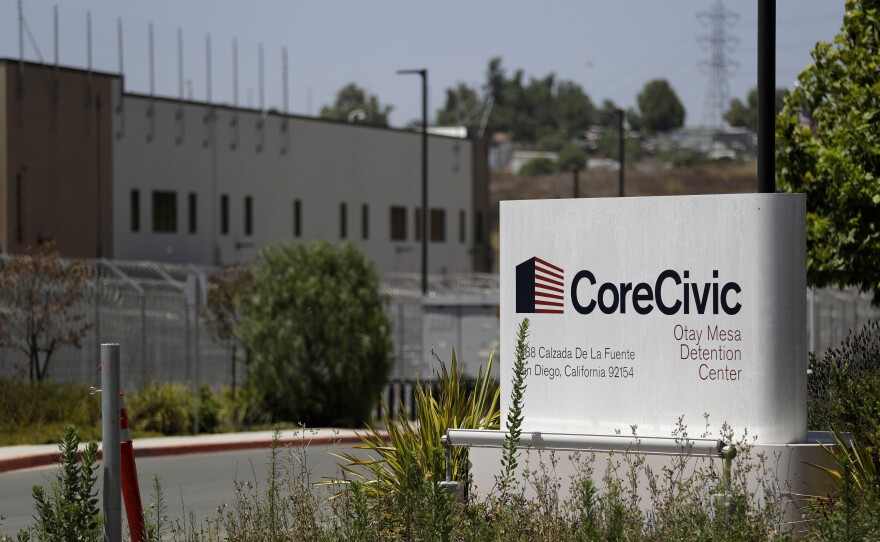Imagine standing in front of a judge and having to represent yourself in court. In a language you don’t speak and under a legal system you know very little about.
At stake is your right to continue living in the United States.
That’s exactly what immigration court is like for thousands of people facing deportation. That’s because, unlike criminal court, people in immigration court don’t get free legal representation.
Only people who can afford to hire a lawyer or find one who is willing to work for free get access to counsel.
But San Diego County has a program to offer free lawyers to people in immigration court.
The San Diego County Immigrant Rights Legal Defense Program started last April.
Only a handful of cities, including Los Angeles and New York City, have similar legal defense programs. San Diego is the first border community to do so.
These programs are part of a growing movement to provide universal representation to people in immigration court. Given how complex immigration law is, those without legal representation are much more likely to get deported, according to immigration lawyers and data from the federal government.
“Navigating this complicated system without a lawyer is very complicated,” said Lauren Cusitello, director of the American Bar Association’s Immigrant Justice Program in San Diego. “Let’s start with language. Any evidence that you present to an immigration court has to be presented in English and any application or form that the court generates is written in English.”
Imagine doing that without speaking the language or understanding the law, she said.
Different systems of justice
Immigration court proceedings can happen very quickly, said Bardis Vakili, a civil rights and immigration lawyer who is part of the county’s program.
“There are life-or-death proceedings of tremendous gravity done in this crazy sort fast food setting where you don’t get a lawyer, you don’t get right to access evidence, and you have to go up against an immigration lawyer from Immigration and Customs Enforcement,” he said.
Vakili’s clients are often detained in places where they have no internet access, cannot gather information about their case or even work to earn money to hire a lawyer.
“The chips are stacked against folks in this system,” he said.
People who represent themselves in immigration court are five times more likely to get adverse outcomes, according to data from the federal government.
Although the program only directly helps people with deportation cases, immigration lawyers said the entire region benefits from it directly and indirectly.
“We all need to recognize that these are our own community members, regardless of their immigration status,” said Paulina Reyes, the managing attorney of the Immigrant Defenders Law Center office in San Diego.
People in immigration court could be neighbors, coworkers, church members or relatives, she said.
Deportations directly impact American citizens, especially in cases where the parents of U.S. citizens get deported.
“We’ve seen so many cases where one parent might be deported and that leaves a single parent alone with their children,” Reyes said.
Since San Diego’s program began a year and a half ago, the number of people with legal representation in San Diego’s immigration court has skyrocketed, from 1,100 in fiscal 2021 to more than 5,000 in fiscal 2023.
So far, lawyers in the program have been assigned 868 cases. Only 220 of them have been completed. Of the completed cases, about 10% ended with the client getting a deportation order, which is lower than the national average.
The program has cost San Diego County taxpayers $1.6 million so far. That number is expected to increase to more than $4 million annually as more cases work through the court process.
Pushback to universal representation
Despite the program’s early success, it is not without controversy.
The two Republicans on the San Diego County Board of Supervisors, Joel Anderson and Jim Desmond have been critical of the fact that the program offers legal representation to people with previous criminal convictions.
According to an annual report of the program, 34 individuals had previous criminal activity. They account for 5% of people who received free legal representation.
In October, Anderson tried to exclude people with criminal convictions from being eligible for the program.
“We’ve got to be thoughtful in our approach and we have to draw definite lines,” he said.
Anderson added that he supported asylum seekers and other migrants who didn’t have criminal records.
Dozens of advocates spoke out against Anderson’s proposal during a Board of Supervisors meeting on Oct. 10. They argued that it would violate the spirit of universal representation that everyone has the right to legal representation independent of their criminal history.
Others pointed out that immigration laws already make it very difficult for people with criminal convictions to receive protection from deportation. Therefore, people with serious convictions are likely to lose their cases either way.
Anderson’s proposal failed to get enough support to get a vote. Desmond did not attend the meeting, and Supervisors Nora Vargas and Terra Lawson-Remer, who initially proposed the program, declined to second Anderson’s motion.
The point of the program isn’t necessarily to stop deportations; it is to ensure the process is fair, Vakili said.
“Not everyone wins their immigration case,” he said. “But we should get it right and having lawyers helps with that.”






